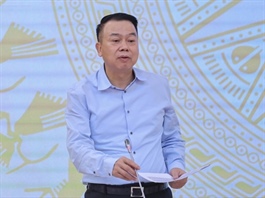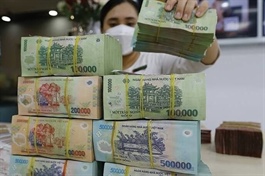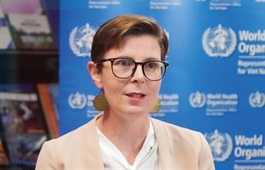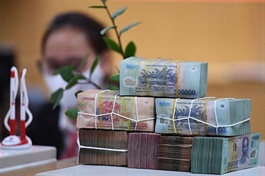Finance sector proud of a glorious tradition, ready to grow alongside the nation
Finance sector proud of a glorious tradition, ready to grow alongside the nation
The Ministry of Finance (MoF) held a ceremony to mark the 80th anniversary of Vietnam’s finance sector on August 8, and received the first-class independence medal in recognition of the sector’s significant contributions to the nation’s development.
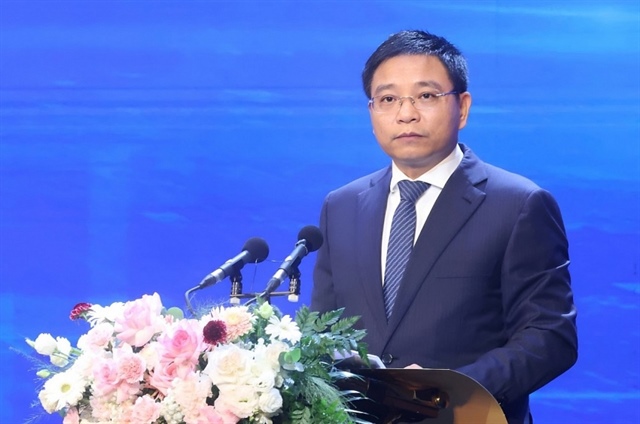
Minister of Finance Nguyen Van Thang |
Minister of Finance Nguyen Van Thang expressed profound gratitude and warmly welcomed Party General Secretary To Lam, leaders, and former leaders of the Party, National Assembly, ministries, sectors, and localities, as well as representatives from diplomatic missions and international organisations attending the event.
“This is a tremendous source of encouragement, and a respectful recognition of the finance sector,” the minister stated.
Thang summarised the 80-year journey of formation, construction, and development in five key milestones:
First, reforms to develop a strategic vision and mindset for economic development in each stage of the country’s growth, from independence and freedom to building socialism, renovation (doi moi), and now the era of dynamic development. This involved shifting from a centrally planned mindset to an open, integrated, and socialist-oriented market economy, proactively creating a new development ecosystem driven by science, technology, innovation, and digital transformation.
These continuous efforts have contributed to an estimated average economic growth rate of about 6.3 per cent annually in the 2021-2025 period, among the highest in the world. In 2025, the target is to achieve 8.3-8.5 per cent growth, with GDP per capita reaching about $5,000, moving Vietnam into the group of upper-middle-income countries.

Party General Secretary To Lam presented the First-Class Independence Order to the MoF, recognising the sector’s significant contributions throughout the nation’s 80 years of development |
Second, improving and reforming fiscal policy to both promote economic growth and effectively mobilise, allocate, and use resources for development; raising people’s living standards; contributing to macroeconomic stability; controlling inflation; and fostering growth.
Currently, state budget revenue reaches about VND2 quadrillion ($80 billion), with the share of development investment spending increasing to 32 per cent, ensuring resources for major infrastructure projects, including 3,000 km of expressways and about 1,700 km of coastal roads. The state budget deficit stands at around 3.3-3.4 per cent of GDP, and public debt at about 37 per cent of GDP, ensuring national financial safety. The country’s credit rating maintains its stable outlook.
Notably, during crises such as the pandemic, fiscal policy played a critical supportive role. The government waived, reduced, or deferred around VND1.1 quadrillion ($44 billion) in taxes, fees, and land use charges to support citizens and businesses, and stimulate production and business activities.
Third, breakthroughs in thought and action in advising on socioeconomic institutional and policy frameworks. The finance sector has researched, drafted, and submitted numerous important laws to the government and National Assembly, creating a transparent, open, and favourable business environment in line with international practices, stimulating strong growth across all economic sectors, unlocking resources, and contributing significantly to national development.
Fourth, establishing and gradually perfecting the institutional, legal, and infrastructure framework for the sustainable development of insurance and securities markets, making them vital channels for investment and capital mobilisation for businesses and the economy.
Annual insurance premiums now account for over 3 per cent of GDP, with about 11 per cent of the population participating in life insurance and tens of millions in non-life insurance. After 25 years, Vietnam’s stock market has around 2,300 listed companies, with a market capitalisation of about 65 per cent of GDP and a bond market size of about 32.8 per cent of GDP.
Fifth, effectively advising on social and health insurance policy mechanisms. Alongside state budget-funded welfare, social and health insurance have increasingly asserted their roles as key pillars of the social security system, ensuring that economic growth is closely tied to social progress, fairness, and human development.
In 2024, social insurance participants reached 20.1 million (42.7 per cent of the labour force), and health insurance covered 95.5 million people (94.3 per cent of the population), achieving the target of 95 per cent coverage by the end of 2025. The finance sector has also effectively managed state reserves, promptly providing rice and essential goods to people affected by natural disasters and epidemics.

Prime Minister Pham Minh Chinh giving the First-Class Labour Order to Minister Nguyen Van Thang |
Looking to the future, Thang sees both opportunities and challenges on the way to become a developing country with a modern industry and an upper-middle income by 2030, and achieve developed, high-income status by 2045.
The finance sector will closely coordinate with ministries, sectors, and localities, mobilising the participation of individuals and businesses to effectively implement five key groups of tasks and solutions:
-
Focus on improving economic and financial institutions, implementing socioeconomic development strategies and integration policies, especially core resolutions; promptly removing bottlenecks, unlocking and leveraging resources from all economic sectors (state, collective, private, and FDI), developing regional economies, and tapping into new development spaces.
-
Implement expansionary fiscal policy in a reasonable, targeted way, closely coordinated with monetary and other macroeconomic policies to maintain macroeconomic stability, control inflation, boost growth, and ensure major economic balances.
-
Mobilise and efficiently allocate development investment resources. Alongside the state budget, maximise resources from the public, businesses, and international capital to promote rapid and sustainable growth.
-
Promote the development of the stock and insurance markets into effective medium- and long-term capital mobilisation channels for the economy; attract international investment funds and encourage public and business participation.
-
Innovate and improve the effectiveness of social security policies, including the social insurance system, to ensure welfare, social progress, fairness, and improved living standards, both materially and spiritually, for the people.
- 10:32 09/08/2025









